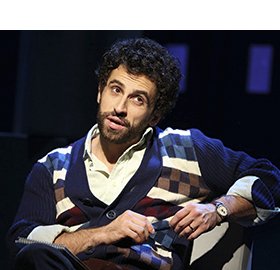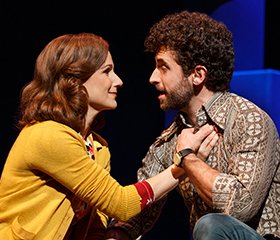Looking over the Falsettos song list this week, in preparation for a conversation with Brandon Uranowitz, I was reminded of what an ensemble effort the show is: with the exception of a few solos the musical’s numbers are performed in small groups. “It’s truly an ensemble piece,” Uranowitz said. “It’s not a Shakespeare play, loaded with soliloquies. It’s a story told by a group of people who are squabbling but also growing closer to each other.” He added: “This process has affected us as actors. We’ve gotten closer outside of work, too.”
In Falsettos, Uranowitz, who grew up in New Jersey and has a BFA in theater from NYU, plays Mendel, a psychiatrist. “I’ve learned a lot about him as I’ve gone along,” Uranowitz said. “What caught me by surprise is his relationship with Jason, his step-son. Until I started living the role I didn’t realize that Mendel’s relationship with Jason is what helps him grow as a person. You’d think that Mendel, as a psychiatrist, would have it together. But he doesn’t begin to have it together until he sees that a boy’s well-being is on the line.”
And how together does Mendel have his career as a psychiatrist? He does, after all, begin a relationship with Trina, a married woman who is his patient. “That’s highly unethical,” Uranowitz said. “But Falsettos is not a complex linear narrative in which every single nuance is explored. You get hints about the characters’ behavior – what’s good, what’s bad.” Such hints, Uranowitz said, help make Falsettos intriguing. “It leaves a lot to the audience’s imagination. A lot of theater these days is spoon-fed to people, so that they can sit back and relax. Falsettos doesn’t do that.”
Uranowitz was introduced to the show as a child. “It happened in a private voice class. I don’t remember which song but I remember thinking that it was amazing.” In addition to lessons, Uranowitz went to an extracurricular theater school. “It was very forward-thinking. We worked on Sondheim and Gershwin.” Uranowitz had a chance to put his Gershwin experience to use two seasons ago on Broadway in An American in Paris. He played Adam Hochberg, a composer and pianist who was based in part on George Gershwin. The performance was so spectacular that it earned Uranowitz a much-deserved Tony nomination.
Though still a young man, Uranowitz has plenty of professional credits. At the age of 11, he was in the world premiere of Ragtime, in Toronto. He took a professional break as a teenager. “I never got tired of working on material,” he said, “but I did get tired of the way that being in the business isolated me from my peers. That was hard to deal with sometimes.”
In neither An American in Paris nor Falsettos does Uranowitz base his performance too closely on those of his predecessors. “I only watched the American in Paris movie once,” he said. “And I have a huge admiration for Chip Zien” – who originated the role of Mendel at Playwrights Horizons – “but I didn’t want to do a second-rate impression of him. I wanted to make Mendel my own.”
Uranowitz said Falsettos isn’t like any production he’s done before. “When a show isn’t sung-through – and sometimes even when it is – there can be pauses for dialogue or other things that can take actors out of the material and force you to work to get back into it. That isn’t the case with Falsettos. From the first chord you jump on the train and ride it to the end.”
Brendan Lemon is the editor of lemonwade.com.

